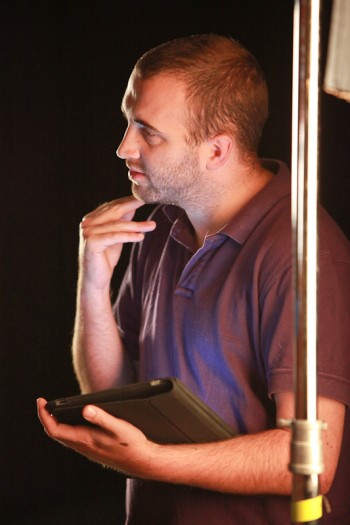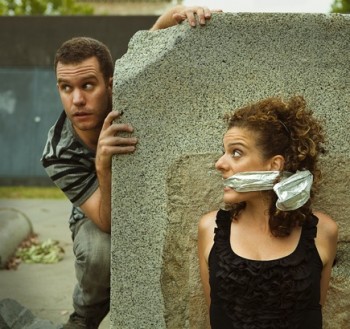Bullet: A Superhero Comedy
Following a sell out season at the Melbourne Fringe Festival, Bullet: A Superhero Comedy won audience and critical acclaim at this year’s Melbourne International Comedy Festival.
Bullet is a fast-paced show that captures the essence of the radio plays of yesteryear and with an added dose of digital technology and ideals, it catapults the audience onto a roller-coaster ride of adrenalin with good old-fashioned comic book tales of destruction and heroism.
I recently sat down with Bullet’s creators, Sean Fabri and Simon J Green, and asked how they came up with the idea of a superhero radio play.
A superhero radio play

Fabri and Green are self-confessed comic book junkies who know and love this genre. As Green explains, “The genre with comic books is well and truly recognised in film as a great way to tell the hero story, but without a $5 million budget a film version of Bullet would not have happened.”
The duo, whose friendship began when Green was still in high school, had already been creating radio sketches and with years of radio and theatre experience between them, it seemed logical to devise Bullet as a radio play.
The process for writing the script was based on the concept of Bullet as a one- hour show that can be broken down into six episodes and serialised on radio on a Friday night.
Why did you write this bit?
Fabri explains that this concept enabled them to write different episodes leading to an intense collaborative process.
“We were constantly questioning our work. Why did you write this bit? Should it be more along these lines? We would write notes to each other, send it back, they’d be answered and we bounced back and forth about seven or eight times each episode until we had really honed it as much as possible. That was Step 1.”
Green says “Step 2 was a series of meetings in cafes where we’d sit over the iPad side by side and go through the script line by line reading it out loud to each other. We would use a digital pen and cross out and re-write stuff that didn’t make sense. We needed to be side by side so we could edit.
According to Fabri, Step 1 took months.
“We kept each other focused and it was such an exciting process. But it was a labor of love and took over six months to complete. Every writer has to force themselves to write and we both understood that enough to force ourselves to do it.”
Green agrees. “We just try and listen to what all the people that are better than us throughout the decades have said and do it. We planned the entire story with a very bird’s eye view of what happens; planning each episode and then planning each beat. We read the script aloud in cafes and we would say things like: there are too many k’s in this sentence or is this an easy thing to say? Has he said the same thing twice? Have we used the word ‘risk’ too many times in thirty seconds? Cut!”
Writing with a friend and reading a guru
Fabri says, “One of the strengths of the writing process overall was that Simon (Green) and I are good friends. But we also have a shared vision where we demand really high quality out of each other, so even though we’re friends I knew I had to get that script tight.” To maintain a level of respect, Green says he had to get his script into Fabri on time. “That’s why collaboration is good because having that other person makes you accountable.”
Their process followed the concepts of script writing guru Robert McKee (Story). Green explains, “Each episode has a beginning, middle and end, and then there’s the overall beginning, middle and end. It is an unusual way to do it because normally you would have a three-act structure and we broke that a little bit by having six segments. But it still has three acts. Episodes 1 and 2 are effectively Act One, 3–5 are Act Two and half of 6 is Act 3.”

Aural theatre
Understanding the complexities of writing for a radio play begins with an examination of the differences in mediums. In theatre, the story is conveyed by what is said; in film, the story is visual and in a radio play, the story has to be heard.
Green highlights this “audio first” dilemma further, “Fabri would have an idea and my response would be: Hmm hmmm. That is completely visual you understand. The army of hang gliders over the city… How?!”
Similarly, some characters were cut because while visually the character would have worked, from an audio point of view, it fell flat on its proverbial face.
They deliberately relied on some established conventions, quite aptly noted by a reviewer who stated that the characters lent on some gender and racial stereotypes. Fabri and Green agree wholeheartedly. As Green explains, “It’s based on a comic book. Our Russian villain is a 60s Russian Bond Girl and it’s probably not at all how a Russian would sound but we were allowed that as a short cut for the audience to say ‘I get this character’.”
The Opposite Zone
Fabri jumps in explaining one of the concepts within Bullet – the Opposite Zone.
“The Opposite Zone was such fun. The rules are so arbitrary. We set up whatever was most convenient at the time. We’re postulating a mirror universe you get through by opening a magical mirror with a key. And then inside it, everything is opposite at least in one aspect. Now, no audience member has ever said ‘What?’ or ‘I don’t get that’. It’s like people intrinsically understand that ‘yes that happens.’ Just like Alice in Wonderland and through the looking glass and Superman’s negative zones where the villains are kept. We have this concept. People get it.”
Fabri has also worked as a medical practitioner and has a background in science, psychiatry and health. As a result, there are jokes and references within Bullet that are entirely accurate.
A claustrum
Fabri delights in explaining. “The character of Meredith Blyte says that Bullet is a highly developed claustrum. A claustrum is a brain structure and no one knows what it does so we are postulating that it is the seed of superpowers that gives you mental mind bullets! The spell that Bullet uses at one point to cause dizziness is Meniera – taken from Meniere’s disease. Dr Meniere’s first name is Prosper. So Prospero is a homage to Shakespeare’s Prospero as well as Dr Strange.”
Another interesting aspect of this show is the use of pre-recorded sounds. They discussed the use of live sounds at length, but according to Fabri, “The idea of performing a comic book story on stage has been attempted in the past but it often comes across very cheesy because you can’t do the special effects. Comic books traditionally deal with massive themes and cataclysmic events like: Zap! The moon is gone! Lasers and bombs.”
They considered musicians on stage but Fabri says,”It all becomes a little unreal – where do you stop? With budget restraints and a desire to be practical, productions will fail if the vision is too unrealistic.”
Green explains this further. “Tradition is all well and good but we aren’t in the 1950s. We don’t see this as a period piece or a homage to 1950s radio plays. We can digitally record sounds now. Why use coconuts for a horse when you can get the sound of a horse?”
Fabri agrees. “We wanted the voice actors to stand out. It’s a rare treat for actors to have this opportunity to do voice work with so many characters.
If the actors also had to do the sound it would have been very difficult. Even if we had one person dedicated to the sound effects, the audience would be watching them and not following the story. With over fifty sound cues, we wanted the story to be the focus because it is very fast paced and challenging.”
For future radio plays they both agree they will continue to use digital sound effects because they are aiming for high production values. As Green says, “We can do so much more, so much more impressively, with a digital sound library and you’re quite limited if you have to do it with real life stuff. For example, how would you do the sound of his mind bullets?”
Genre work includes action, science fiction, fantasy, war and crime and is rarely set in the present day, present planet or present version of reality. Together Fabri and Green are slowly finding people who share the same vision of making genre work and strongly believe that it is under-made in Australia.
Their aim is to do something different and target the niche market. Fabri believes, “If you’re innovative; you come up with a strong concept; if you’re different, then you will re-define what happens rather than trying to be another clone of what was successful 10 years ago.”
Green concurs. “The interesting part about the radio play genre is what we can do with it.” While the ABC and Radio National have not yet embraced Bullet to be performed as a six part radio series, the final curtain has certainly not been drawn on this production.
A hit
Having witnessed Bullet at the Melbourne International Comedy Festival, I have no doubt this show will be a hit on radio. This talented duo are carving out a niche of their own and it is only a matter of time before Bullet and future projects by Fabri, Green and friends (including Bullet’s Director, Ben McEwing) will soon be hitting our theatres, screens and airwaves.
Bullet: A Superhero Comedy
Written by Sean Fabri and Simon J Green
Directed by Ben McEwing
Sound design by Risk Sound
Sound Operator: Dave Chakman
Starring: Stefan Taylor, Andi Snelling, Simon J Green, Nicholas Barker-Pendree, Simon Morrison-Baldwin and Maria Coviello



